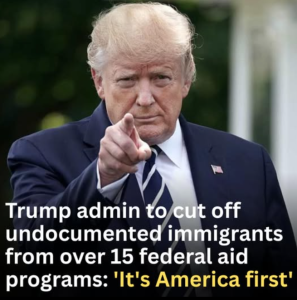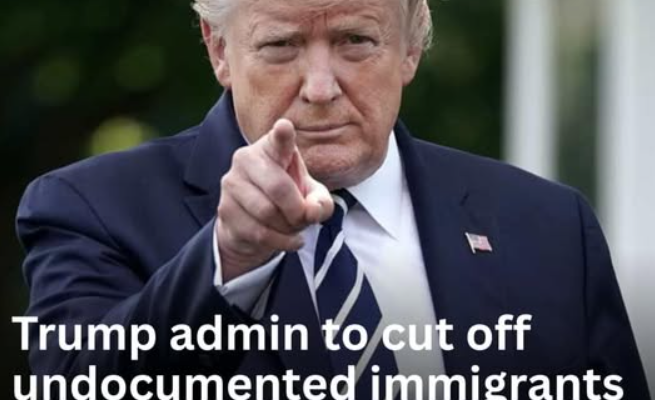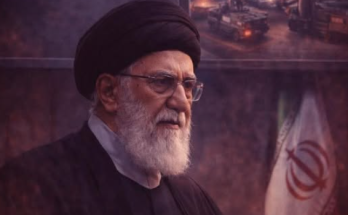 Trump Administration to Exclude Undocumented Immigrants from More Than 15 Federal Aid Programs: ‘America Comes First’
Trump Administration to Exclude Undocumented Immigrants from More Than 15 Federal Aid Programs: ‘America Comes First’
The Trump administration recently announced a sweeping executive order that aims to exclude undocumented immigrants from more than 15 federal aid programs. This directive, which has stirred national debate, affects programs ranging from early childhood education and healthcare to career training and substance abuse treatment. The administration frames this policy as a measure to prioritize American citizens, arguing that taxpayer-funded benefits should be reserved for those legally entitled to them.
Signed on August 7, 2025, the executive order specifically targets undocumented immigrants, though some critics warn that its effects could reach other groups, including lawfully residing immigrants and even U.S. citizens living in mixed-status households. Programs affected include Head Start, federally funded health clinics, adult education programs, workforce development initiatives, and substance abuse rehabilitation services. Health and Human Services Secretary Robert F. Kennedy Jr. emphasized that the order enforces the rule of law and protects resources for Americans, arguing that prioritizing citizens is essential to the country’s social and economic well-being.
Proponents of the policy argue that it fulfills a longstanding promise to ensure that public resources are directed to American taxpayers first. They contend that federal funds are limited, and prioritizing citizens guarantees that essential programs can meet the needs of families who have contributed to the system. Supporters also point to concerns about the fiscal impact of extending public assistance to undocumented immigrants, suggesting that exclusion is necessary to avoid overburdening state and federal budgets.
However, the policy has faced sharp criticism from civil rights organizations and immigration advocates. The American Civil Liberties Union (ACLU) has warned that the order may be unlawful, arbitrary, and capricious, arguing that it fails to consider the real-world consequences for vulnerable populations. The National Immigration Law Center (NILC) echoed these concerns, noting that broad application of the rule could create fear and confusion among immigrant communities, discouraging eligible residents from seeking essential services. Experts warn that excluding undocumented immigrants from these programs could exacerbate poverty, reduce access to education, and increase health risks, not just for immigrants themselves but for broader communities that rely on public health and social services.
The executive order also represents a continuation of the Trump administration’s broader agenda on immigration policy. Earlier actions, including Executive Order 14159, expanded the use of expedited removal for undocumented immigrants, increased penalties for immigration violations, and further restricted access to public benefits. Additionally, the administration has proposed a mid-decade census intended to exclude undocumented immigrants from the population count used for congressional representation and federal funding allocation. Legal experts argue that such a move could face constitutional challenges, as the Constitution requires counting all residents for purposes of apportionment and representation.
States with large immigrant populations are likely to feel the impact of the policy most acutely. Texas, home to roughly two million undocumented immigrants, could see significant reductions in federal funding for education, healthcare, and other essential services if these individuals are excluded. Similarly, states like California, Illinois, and New York, which have historically provided state-level support for undocumented residents, may face increased pressure on local resources as federal funding diminishes. Some states have already begun adjusting programs, freezing enrollment, capping participation, or rolling back services in anticipation of federal restrictions.
Beyond legal and administrative concerns, the policy raises broader ethical and societal questions. Critics argue that denying access to healthcare, education, and social services can perpetuate cycles of poverty and marginalization. For children in undocumented families, restricted access to early education programs like Head Start could have long-term consequences on cognitive development, academic achievement, and social mobility. Public health experts also warn that excluding individuals from healthcare programs can have ripple effects, increasing the risk of disease transmission and placing additional burdens on emergency services.
Supporters maintain that the policy is not intended to harm immigrant communities but to reinforce fairness and responsibility in the use of taxpayer dollars. They argue that every government has a duty to ensure its resources serve the citizens who fund them, and that prioritizing Americans does not negate support for those in need through private or charitable avenues. They also suggest that clearer distinctions between citizens and non-citizens in public assistance programs could improve program efficiency and reduce fraud.
The executive order is likely to face legal challenges from multiple angles. Civil rights groups may sue on the grounds that the policy violates constitutional protections, including equal protection under the law. Immigration advocacy organizations could argue that the directive is discriminatory and inconsistent with established federal law governing public benefits. Additionally, states may challenge the policy if it results in unfunded mandates or places undue financial and administrative burdens on local governments. The litigation process could take months or even years, creating uncertainty for affected communities in the meantime.
While the immediate consequences of the policy are still unfolding, its announcement has already had significant effects on public discourse. Immigrant families report confusion and anxiety about eligibility for programs they have long relied upon, while community organizations scramble to provide guidance and support. Public opinion is divided, with supporters praising the administration for prioritizing citizens and critics decrying what they see as an inhumane approach that undermines the principles of inclusion and fairness.
In conclusion, the Trump administration’s executive order to exclude undocumented immigrants from over 15 federal aid programs marks a major shift in U.S. immigration and social welfare policy. Framed by the administration as a necessary step to ensure resources are reserved for American citizens, the policy raises complex legal, social, and ethical questions. Its effects are likely to be felt most acutely in states with large immigrant populations, as families and service providers navigate the new restrictions. As legal challenges develop and the public debate continues, the order represents a defining moment in the ongoing national conversation over immigration, public benefits, and the balance between citizenship and access to essential services.

